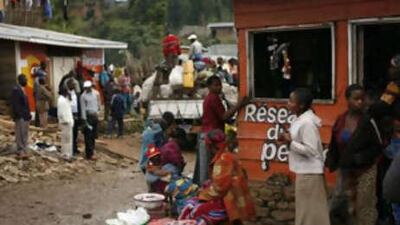NYABIBWE, DR Congo // The miners are already getting drunk at 4 o'clock in the afternoon. Their clothes and faces covered in yellow dust, they swig 750ml bottles of Primus beer as they walk home from the mines. High above the road, an orange gash in the hillside between banana trees and cassava plants reveals the cassiterite mine, where men can be seen toiling into the afternoon. Access to this mine is forbidden to outsiders, a local authority in charge of the mine said. The miners here in the South Kivu province of eastern Democratic Republic of Congo are distrustful of foreigners. The Canadian company that controls this mine, Shamika Resources, is trying to take away the miners' livelihood, they said. Shamika Resources has a permit to explore cassiterite in the region. Soon, the company will move into the mining phase bringing in heavy equipment and driving out the small-scale miners. "They are angry because they want to keep on working like this," said Robert Muongo, director of Shamika's DR Congo operations. "We will hire some of the miners, but not all. Some will have to go out." One miner, who requested anonymity, expressed his frustration. "They take all of this and give us nothing," he said holding an orange-coloured rock. The rock is heavy, and flecks of shiny silver metal glisten in the dull stone. This is cassiterite, a tin ore used in making chips for mobile phones and computers that has fuelled Congo's deadly war. DR Congo is both blessed and cursed with an abundance of natural resources. With deposits of gold, diamonds, copper, cobalt, cassiterite and coltan, which is also used in circuitry, the country has the potential to become one of the wealthiest in the developing world. Yet DR Congo ranks among the world's poorest countries. The Congolese people, who on average live on less than US$1 (Dh3.67) a day, have seen a parade of entities plunder their country's natural resources since colonial times. The Belgian colonisers brutalised the Congolese people and used them as slaves on the rubber plantations to feed Europe's industrial revolution. Mobutu Sese Seko, the dictator who ruled the country for 30 years, nationalised the mining sector and then stole billions of dollars from the country's coffers. These days, foreign companies and rebel groups control the nation's mineral wealth. This mine happens to be in a government-controlled area. In rebel-held regions, the mineral wealth ensures the militias have a steady supply of guns, according to a report by Global Witness, a human rights group that monitors natural resources. "Natural resource exploitation by private companies and armed factions continues to provide the incentives and the means to maintain military control," the report said. "Cassiterite has taken over from coltan as the resource of choice for military groups in the Kivu provinces." Congo's 10-year civil war has killed 5.4 million people. Thousands more have been raped and tortured. Politics and ethnic tensions are blamed for the war, but mineral wealth is a big reason why armed groups have continued to fight. The US Congress is considering the Conflict Coltan and Cassiterite Act, which would require that minerals from DR Congo carry a certificate that they were not mined by rebel groups. This is an attempt to give US consumers peace of mind that their new mobile phone did not fund the mass slaughter of civilians. Conditions in the government-controlled mines are not much better than in rebel-held mines. Artisanal miners work long days prospecting for a few kilograms of minerals that will buy them food. "We work 12 hours each day," said a miner named Clovis. "It is very difficult work." Some of the miners walking a road in South Kivu province are as young as 10. They work in the mines when their school is on holiday earning extra money for their families, they said. One kilogram of cassiterite will earn them US$3 (Dh11). The miners sell their minerals to middlemen who sell them to exporters in Goma, the provincial capital. Goma is home to about two dozen cassiterite and coltan processing and exporting companies. At Kivu Metal, men are inspecting piles of coltan on a plastic tarp. The mineral looks like black sand with tiny specks of glittering metal. In the late 1990s, coltan was the most sought after mineral for computer chip-makers. Coltan prices were high in DR Congo, and armed groups profited from exploiting the mineral. "Now people want cassiterite in so many countries," said Emmanuel Kanane, director of Kivu Metals. The world's appetite for cheap electronics is fuelling the demand for such Congolese minerals as coltan and cassiterite, and the young miners have come to learn the uses for the rocks and sand they spend all day toiling to unearth. "They are starting to know what the minerals are used for," Mr Kanane said. "At first, they thought it was going to make weapons to kill them." mbrown@thenational.ae

Rebels cash in on Congo's riches
The miners here in the South Kivu province of eastern Democratic Republic of Congo are distrustful of foreigners.
Most popular today
